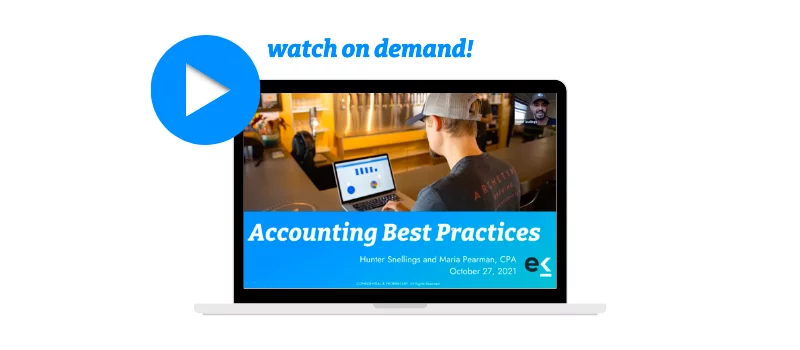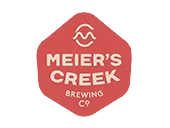Before that hoppy, foamy brew meets your customer’s glass, a number of practical processes have to happen — ordering materials, inventory management, fermentation, and more. One of the most important processes, however, is brewery accounting. Some of us might have a knack for numbers and details, but that isn’t everyone’s speed.
For those who need some brewery accounting assistance, Ekos’s Hunter Snellings partnered up with Maria Pearman, CPA for a webinar. Maria and Hunter shared many actionable takeaways for setting your business up for growth and long-term success. For all of the details, you can watch their webinar here. If you need to start with the basics, read on for some best practices when it comes to your accounting processes.
Table of contents
Budgeting
When it comes to spending your money, we all know that wisely is the only way. To get there, you need to plan and put a solid budget in place. According to Maria, budgeting is “the most effective management tool that a company can put into practice.” This is because without goals, there’s no way to see how you’re growing as a company. Budgets act as helpful roadmaps for both the financial and operational sides of your business, Maria said.
Ideally, your budgeting for the upcoming year will start in September and conclude in mid-December. This way, you’ll have had ample time to plan out everything you need to start out the new year with a bang.
The Budgeting Process
As far as a timeline goes, your first meeting should be with your leadership team. The focus here will be on reviewing last year’s numbers, tracking whether you met the annual goals your team set for the business last year, and discussing how to progress toward long-term goals in the coming year. At the end of this meeting, ask your sales teams to work out their projected budgets and get back to you in about two weeks, after which your production, administrative, and marketing teams can set their budgets to align with your sales goals.
Whether you self-distribute, work with a distributor, or just sell in your taproom, it’s important that the sales team completes budget worksheets first. This is because other teams, like marketing, frequently base their plans and budgets on projected revenue. Without the sales team’s input, your other departments don’t know the goal they are working toward.
After everyone has communicated numbers to the CFO, they can consolidate all requests and share next year’s plans with leadership. Communication is key here and, ideally, your team will be able to talk through any concerns or problems with the budget to get it all set and ready to go by mid-December.
Brewery Accounting KPIs
KPIs, or key performance indicators, are a crucial part of measuring your performance and how effectively you’ve managed your internal spending this year. Three KPIs stick out among the rest:
Labor/BBL
This KPI has to do with how much you are paying for labor per barrel you produce. Because labor is so expensive, it’s important to see if you’re getting your money’s worth. If not, you may need to reevaluate the number of team members working or how you’re pricing your alcohol.
Gross Margin
Gross margin lets you know whether your pricing model is effective. This is calculated by taking the difference between revenue and COGS — AKA, what you have to cover overhead.
Current Ratio
Current ratio measures your business’s liquidity, or ability to pay bills as they come. It is measured by dividing current assets by current liabilities.
Best Practices
Now that we’ve settled on a few brewery accounting KPIs to be mindful of, we can talk about KPI best practices. It’s essential to evaluate your KPIs regularly. These indicators are just that — indicators of the health and performance of your business.
You should set goals for your KPIs and track your business’s progress in achieving these goals. If you start keeping track of your data now, it will be easy to see how far you’ve come over time. Plus, monitoring KPIs will encourage your team to try new things in order to meet them. For example, if you want to have more liquidity in your business, how can you set into motion a plan to accomplish this? Do your sales reps need to increase their monthly sales by a certain dollar amount to allow you to pay off more debt? Or do you need to move to a less expensive space?
Whatever goals you have, monitoring your KPIs and setting goals will help you and your teams develop solutions to achieving them. Technology can prove very helpful in tracking your KPIs — having a digital dashboard with forecasted and current sales, inventory usage, and detailed COGS reports can give you full visibility into your business’s success and progress toward reaching your targets. Without a digital platform, it can be difficult to gather key data in one place and will waste precious time that you could spend working on your goals.
TTB & Tax Reporting
TTB reporting — we know it’s daunting, but it doesn’t have to be so scary if you understand the basics. We recommend engaging a CPA or tax accountant if you need help with the nitty gritty, but here are some of the essentials.
Brewer’s Report of Operations
The Brewer’s Report of Operations is required for all breweries. This paperwork tracks all product movement in and out of your bonded area. Depending on your excise tax liability, this report will be filed quarterly or monthly.
Excise Tax
Excise taxes are due on all alcohol removed for consumption from bonded areas on the 14th day after the close of the tax period, unless that day lands on a weekend or holiday. Then, your taxes are due on the preceding business day. This rate is different depending on how many barrels you produce each year. One thing to note about excise tax is that if you are contract brewing in-house for another brewery, that alcohol needs to be taxed from your space as well.
Utilizing Technology
One way to greatly simplify your filings is to utilize inventory management software that integrates with brewery accounting softwares like QuickBooks and Xero. Doing so can save your team more than 10 hours per month and eliminate the need to manually pull and reconcile reports. Instead, your software could automatically populate reports with accurate data based on your inventory, leaving your team more time to make beer and connect with customers.
State Compliance
Finally, don’t forget about compliance in your home state (and every other state you do business in). Depending on where your business is located, you may have extra taxes and regulations to consider. Be sure to visit your state’s department of revenue and ABC commission websites or call those entities for more information.
We recommend enlisting legal help from someone who is familiar with alcohol rules in your state. Regulations can be tricky, and you certainly don’t want to get caught up in the law for a simple misunderstanding.
Want More? Hear From the Experts

If all of this sounds like an oversimplification of the process, it is. Be sure to check out this webinar to hear all the details from Hunter Snellings at Ekos and Maria Pearman, CPA.





